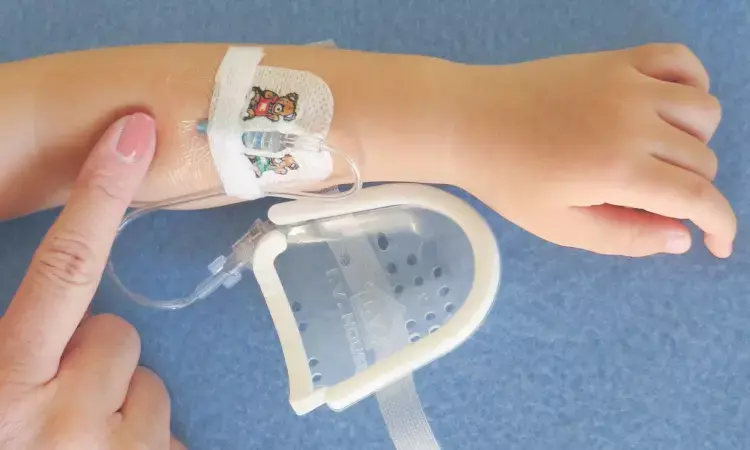- Home
- Medical news & Guidelines
- Anesthesiology
- Cardiology and CTVS
- Critical Care
- Dentistry
- Dermatology
- Diabetes and Endocrinology
- ENT
- Gastroenterology
- Medicine
- Nephrology
- Neurology
- Obstretics-Gynaecology
- Oncology
- Ophthalmology
- Orthopaedics
- Pediatrics-Neonatology
- Psychiatry
- Pulmonology
- Radiology
- Surgery
- Urology
- Laboratory Medicine
- Diet
- Nursing
- Paramedical
- Physiotherapy
- Health news
- Fact Check
- Bone Health Fact Check
- Brain Health Fact Check
- Cancer Related Fact Check
- Child Care Fact Check
- Dental and oral health fact check
- Diabetes and metabolic health fact check
- Diet and Nutrition Fact Check
- Eye and ENT Care Fact Check
- Fitness fact check
- Gut health fact check
- Heart health fact check
- Kidney health fact check
- Medical education fact check
- Men's health fact check
- Respiratory fact check
- Skin and hair care fact check
- Vaccine and Immunization fact check
- Women's health fact check
- AYUSH
- State News
- Andaman and Nicobar Islands
- Andhra Pradesh
- Arunachal Pradesh
- Assam
- Bihar
- Chandigarh
- Chattisgarh
- Dadra and Nagar Haveli
- Daman and Diu
- Delhi
- Goa
- Gujarat
- Haryana
- Himachal Pradesh
- Jammu & Kashmir
- Jharkhand
- Karnataka
- Kerala
- Ladakh
- Lakshadweep
- Madhya Pradesh
- Maharashtra
- Manipur
- Meghalaya
- Mizoram
- Nagaland
- Odisha
- Puducherry
- Punjab
- Rajasthan
- Sikkim
- Tamil Nadu
- Telangana
- Tripura
- Uttar Pradesh
- Uttrakhand
- West Bengal
- Medical Education
- Industry
PIVCs secured with integrated securement dressings and tissue adhesive significantly reduce PIVC failure for children: JAMA

Australia: Peripheral intravenous catheters (PIVCs) secured with integrated securement dressings and tissue adhesive compared to traditional bordered polyurethane dressings significantly reduce PIVC failure in children admitted to the hospital via the emergency department (ED), says a new study.
"The randomized clinical trial comprising 383 children revealed that PIVC failure was highest with traditional bordered polyurethane dressings (34%) and lowest with integrated securement dressing and tissue adhesive (12%)," the researchers reported in JAMA Pediatrics.
Peripheral intravenous catheter insertion is a common procedure in an ED, impacting around 70% of hospitalized patients. Despite their widespread use, the failure of these essential devices is frequent and there is a need for new securement strategies that may reduce failure and improve patient outcomes. Therefore, Brooke Charters, Logan Hospital, Brisbane, Queensland, Australia, and colleagues aimed to evaluate the clinical effectiveness of novel PIVC securement technologies for children to reduce catheter failure.
For this purpose, the researchers conducted a 3-arm, parallel-group, superiority randomized clinical trial at 2 regional Australian hospitals from 2020 to 2022. Children aged 6 months to 8 years who were anticipated to require admission with a PIVC for at least 24 hours of in-hospital treatment were eligible.
383 patients (51% female; median age 36 months) were randomly allocated in a 1:1:1 ratio to standard care (n=134), bordered polyurethane (n=118) (Tegaderm [3M]), integrated securement dressing (SorbaView SHIELD [Medline]), and integrated securement dressing (ISD) with tissue adhesive (TA) (n=131). One catheter was studied per patient.
The study's primary outcome was PIVC failure, defined as premature cessation of PIVC function for any reason before the completion of planned treatment. Secondary outcomes included PIVC longevity, PIVC complications (any time dislodgement, infiltration, occlusion, partial dislodgement, device leaking, extravasation, phlebitis, pain), pain on removal (caregivers and participants; 0-10 scale relevant to age), intervention acceptability (participants, clinicians, caregivers; 0-10 scale), PIVC longevity, health care costs, and adverse costs.
The study led to the following findings:
- PIVC failure was lowest in integrated securement dressing with tissue adhesive (12%; adjusted hazard ratio [aHR], 0.47) compared with integrated securement dressing (21%; aHR, 0.78) and standard care (34%).
- Direct costs were significantly lower for integrated securement dressing with tissue adhesive (median, Australian dollars [A$], 312 [A$1 is equal to $0.65 US dollars]; IQR, A$302-A$380) and integrated securement dressing (median, A$303; IQR, A$294-A$465) compared with standard care (median, A$341; IQR, A$297-A$592) when considering the economic burden related to failure of devices.
- PIVC longevity and intervention acceptability were similar across all groups.
"These findings support the preferential use of ISD and TA to secure PIVCs to reduce costs and improve patient outcomes," the researchers wrote.
"Further research should focus on implementation in inpatient units where prolonged dwell and reliable intravenous access is most required," they concluded.
Reference:
Charters B, Foster K, Lawton B, et al. Novel Peripheral Intravenous Catheter Securement for Children and Catheter Failure Reduction: A Randomized Clinical Trial. JAMA Pediatr. Published online April 01, 2024. doi:10.1001/jamapediatrics.2024.0167
Dr Kamal Kant Kohli-MBBS, DTCD- a chest specialist with more than 30 years of practice and a flair for writing clinical articles, Dr Kamal Kant Kohli joined Medical Dialogues as a Chief Editor of Medical News. Besides writing articles, as an editor, he proofreads and verifies all the medical content published on Medical Dialogues including those coming from journals, studies,medical conferences,guidelines etc. Email: drkohli@medicaldialogues.in. Contact no. 011-43720751


